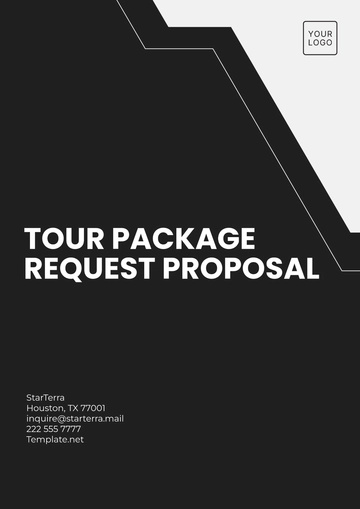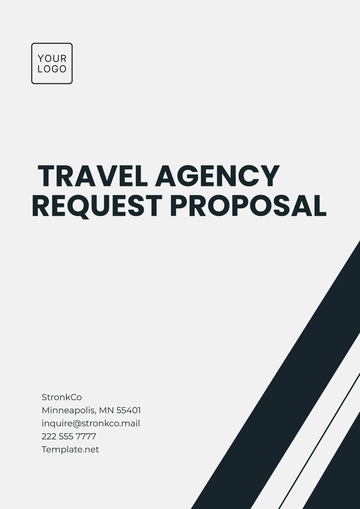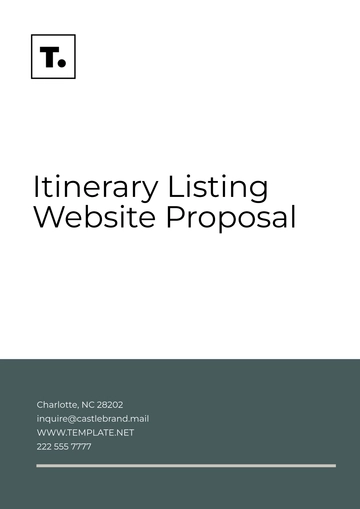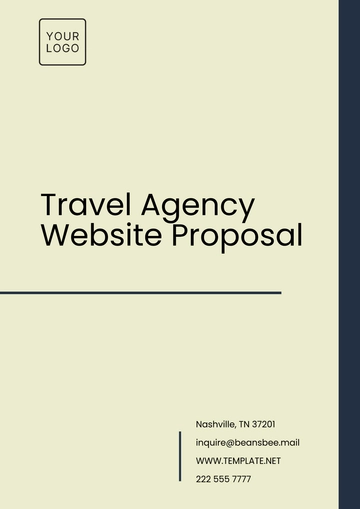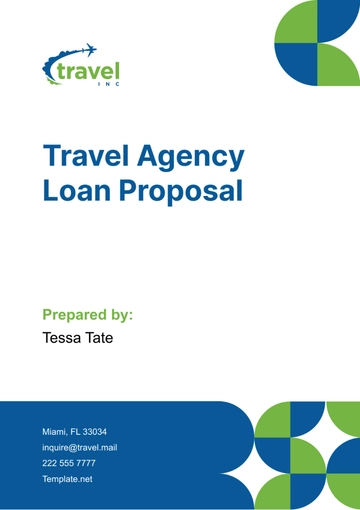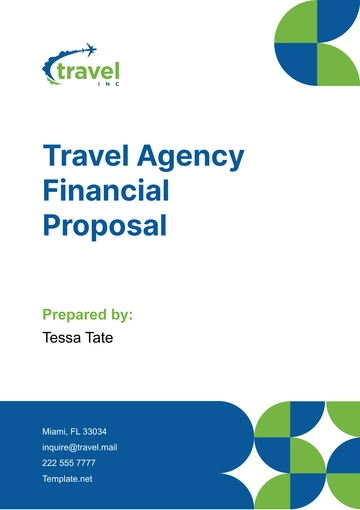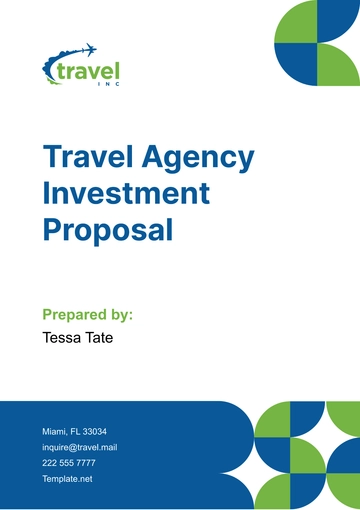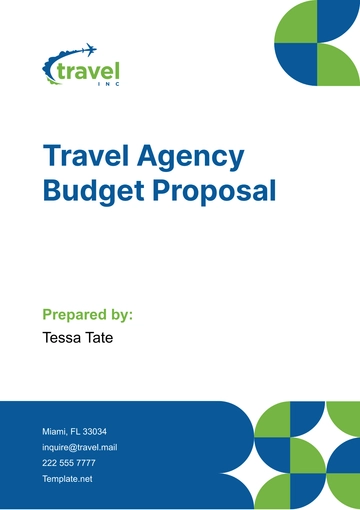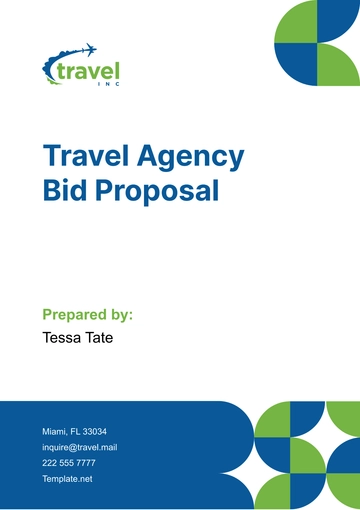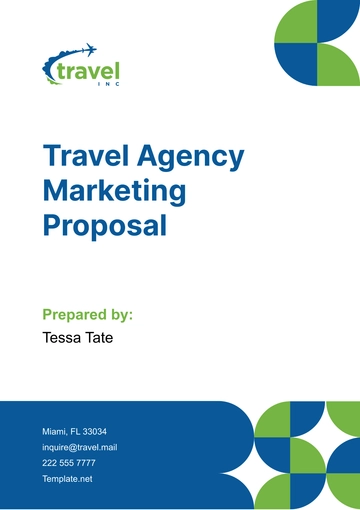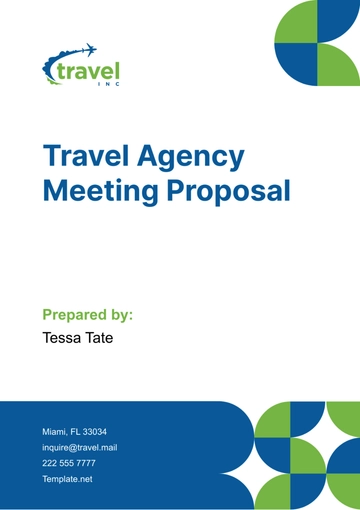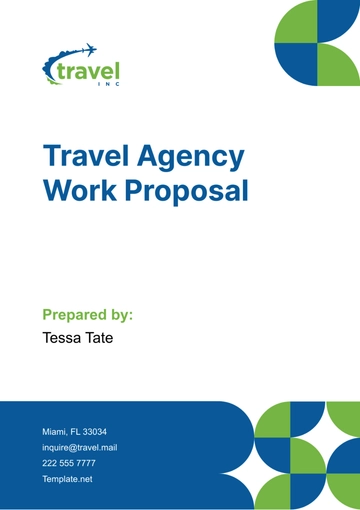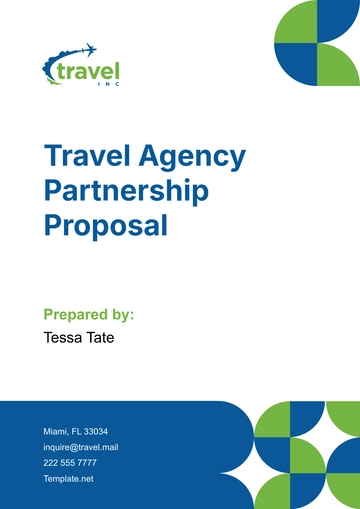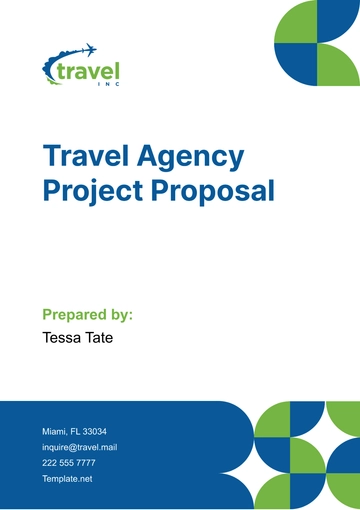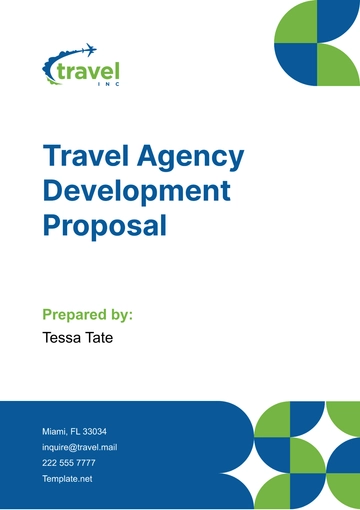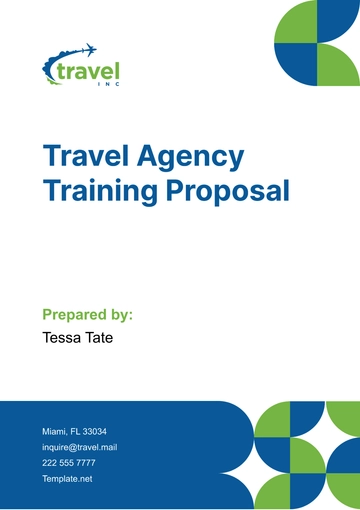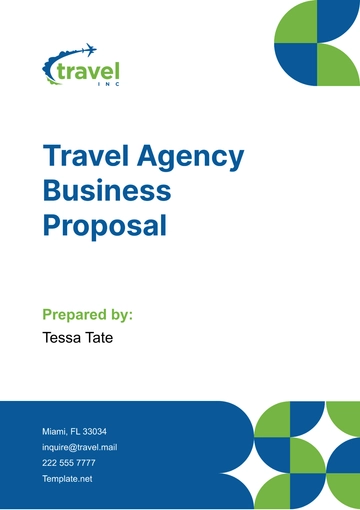Free Travel Agency Marketing Proposal
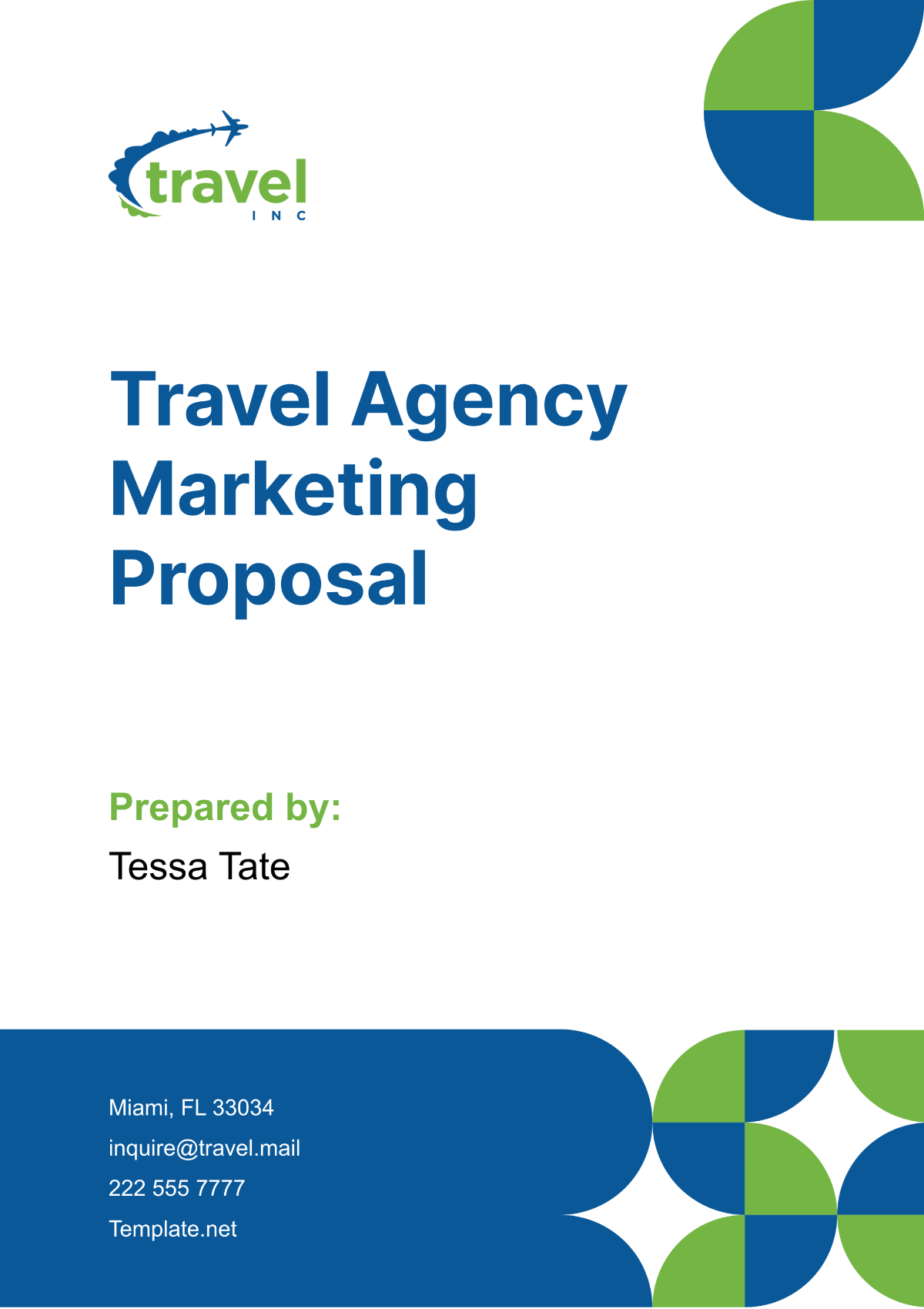
A. Executive Summary
Welcome to [Your Company Name]'s comprehensive marketing proposal, crafted to propel our brand to new heights in the vibrant landscape of the travel industry. With [X] years of unwavering commitment to excellence, we stand ready to showcase our strengths and unique offerings to discerning travelers across the United States. Our strategic focus lies in captivating the attention of affluent clientele seeking bespoke travel experiences that surpass expectations. Through a meticulous blend of personalized service, cutting-edge technology, and strategic partnerships, we aim to carve a distinctive niche in the market. This proposal encapsulates our dedication to elevating customer satisfaction, driving sales, and solidifying our position as a premier travel agency in the hearts and minds of travelers nationwide.
B. Introduction and Background
[Your Company Name] takes pride in being a pioneer in the travel industry, catering to the diverse needs of travelers across the United States. Established in [2050], our agency has evolved into a trusted partner for individuals and families seeking unforgettable travel experiences. Our journey began with a simple yet profound mission: to inspire wanderlust and facilitate seamless travel adventures for our valued clients. Over the years, we have remained steadfast in our commitment to excellence, continually refining our services to exceed the expectations of even the most discerning travelers.
At [Your Company Name], we believe that travel is not just about reaching a destination; it's about embarking on a transformative journey filled with discovery, connection, and enrichment. Guided by this belief, our team of seasoned travel experts is dedicated to curating tailor-made itineraries that reflect the unique preferences and interests of each traveler. Whether it's a luxury beach retreat, a cultural immersion tour, or an adrenaline-fueled adventure, we are committed to crafting experiences that leave a lasting impression.
In today's dynamic travel landscape, we recognize the importance of staying abreast of industry trends and emerging consumer preferences. From the rise of experiential travel to the growing demand for sustainable tourism initiatives, we actively monitor market dynamics to ensure that our offerings remain relevant and impactful. Through continuous innovation, strategic partnerships, and a relentless pursuit of excellence, we are poised to lead the way in shaping the future of travel.
C. Market Analysis
In an ever-evolving landscape, understanding the intricacies of the travel market is paramount to success. This comprehensive market analysis delves into the dynamic forces shaping the industry, providing invaluable insights into customer demographics, competitor landscapes, emerging trends, and potential opportunities and challenges. By illuminating key market dynamics, this analysis serves as a guiding compass, steering [Your Company Name] towards informed decision-making and strategic planning.
Customer Demographics
Understanding the demographics of our target audience is crucial for tailoring our services to their specific needs and preferences. Our research indicates that our primary customer base consists of affluent individuals and families aged between 25 and 55, with a penchant for luxury and experiential travel. Additionally, we have observed a growing trend among millennials and Gen Z travelers seeking authentic cultural experiences and sustainable tourism initiatives.
Competitor Analysis
In the fiercely competitive travel industry, it's imperative to have a comprehensive understanding of our competitors' strengths, weaknesses, and market positioning. Through thorough analysis, we have identified key competitors ranging from established travel agencies to online booking platforms. While competition is stiff, our unique value proposition, personalized service offerings, and strong industry partnerships set us apart in the market.
Industry Trends
The travel industry is constantly evolving, driven by changing consumer preferences, technological advancements, and global events. Recent trends indicate a shift towards experiential travel, with travelers seeking immersive cultural experiences and off-the-beaten-path destinations. Moreover, there is a growing demand for sustainable tourism initiatives, highlighting the importance of eco-friendly practices and responsible travel.
Opportunities and Challenges
Despite the challenges posed by global uncertainties such as geopolitical tensions, the travel industry presents significant opportunities for growth and innovation. The rise of digital marketing channels, advancements in technology, and the resurgence of domestic travel present avenues for expansion and diversification. However, challenges such as changing travel restrictions, fluctuating consumer confidence, and sustainability concerns require proactive strategies to mitigate risks and capitalize on emerging opportunities.
Through comprehensive market analysis, we aim to gain invaluable insights into consumer behavior, market trends, and competitive dynamics, empowering us to develop targeted marketing strategies and deliver exceptional value to our customers.
D. Marketing Objectives
In setting our sights on future endeavors, [Your Company Name] lays out a blueprint of SMART marketing objectives aimed at propelling our brand forward in the dynamic realm of travel. Through clear, measurable, and time-bound goals, we aspire to navigate the market with precision, ensuring our efforts remain aligned with our overarching mission of delivering exceptional travel experiences.
Increase Brand Awareness: Elevate brand visibility by 20% within the next year through targeted advertising campaigns and strategic partnerships.
Expand Market Share: Capture an additional 15% of the market share in key demographics within the next 18 months through innovative marketing initiatives.
Boost Sales: Achieve a 25% increase in sales volume within the next two years through enhanced customer engagement and upselling strategies.
E. Marketing Strategies and Tactics
In the dynamic landscape of travel marketing, [Your Company Name] unveils a comprehensive array of strategies and tactics meticulously crafted to realize our SMART marketing objectives. This section delineates our multifaceted approach, encompassing both digital and offline channels, to captivate audiences, foster engagement, and drive conversions. By leveraging the power of integrated marketing campaigns, we endeavor to forge meaningful connections with travelers worldwide, positioning ourselves as the premier choice for unforgettable travel experiences.
1. Digital Marketing
Utilizing online channels to reach and engage with our target audience effectively.
a. Social Media Marketing
Leveraging platforms such as Instagram, Facebook, and Twitter to showcase visually compelling travel content, engage with followers, and drive website traffic.
b. Content Marketing
Creating informative and inspiring blog posts, articles, and videos to establish thought leadership, attract organic traffic, and foster brand loyalty.
c. Email Campaigns
Sending personalized email newsletters, promotions, and travel updates to subscribers, nurturing leads, and encouraging repeat bookings.
2. Offline Marketing
Implementing traditional marketing methods to complement our digital efforts and reach a broader audience.
a. Print Advertising
Placing ads in travel magazines, newspapers, and brochures to increase brand visibility among offline audiences.
b. Partnerships
Collaborating with hotels, airlines, and tour operators to offer exclusive travel packages, cross-promotions, and co-branded marketing initiatives.
c. Events and Experiential Marketing
Hosting travel expos, workshops, and community events to engage with potential customers face-to-face and showcase our expertise and offerings.
3. Integrated Marketing Campaigns
Combining online and offline marketing tactics to create cohesive and impactful campaigns.
a. Influencer Partnerships
Collaborating with travel influencers and bloggers to create sponsored content, share authentic travel experiences, and reach new audiences.
b. Contests and Giveaways
Organizing social media contests and giveaways to generate buzz, increase engagement, and grow our online following.
c. Remarketing Campaigns
Retargeting website visitors and abandoned cart users with personalized ads to encourage conversions and maximize ROI.
F. Budget and Resource Allocation
Strategic planning necessitates prudent allocation of resources. In this section, [Your Company Name] meticulously details the financial framework underpinning our marketing endeavors. Through transparent delineation of budgetary allocations, we ensure optimal utilization of resources to realize our marketing objectives. By fostering accountability and efficiency, we pave the way for sustained growth and success in the competitive landscape of travel marketing.
Marketing Activity | Estimated Cost ($) |
|---|---|
Social Media Marketing | $XX,XXX |
Content Marketing | $XX,XXX |
Email Campaigns | $XX,XXX |
Print Advertising | $XX,XXX |
Partnerships | $XX,XXX |
Events and Experiential | $XX,XXX |
Influencer Partnerships | $XX,XXX |
Contests and Giveaways | $XX,XXX |
Remarketing Campaigns | $XX,XXX |
Miscellaneous Expenses | $XX,XXX |
Total Budget | $XXXXXX |
G. Measurement and Evaluation
Accountability lies at the heart of our marketing philosophy. This section delineates [Your Company Name]'s commitment to measuring and evaluating the efficacy of our marketing strategies. Through the diligent identification of key performance indicators (KPIs) and adherence to structured evaluation timelines, we ensure transparency and accountability in assessing the impact of our efforts. By leveraging data-driven insights, we strive for continuous improvement and excellence in achieving our marketing objectives.
1. Key Performance Indicators (KPIs)
Identifying measurable metrics to gauge the success of our marketing initiatives.
Brand Awareness: Increase in website traffic, social media engagement, and brand mentions.
Market Share Expansion: Growth in market share percentage and customer acquisition rates.
Sales Revenue: Increase in sales volume, conversion rates, and revenue generated from marketing campaigns.
Customer Engagement: Improvement in email open rates, click-through rates, and customer feedback scores.
Online Presence: Growth in website rankings, social media followers, and online reviews.
2. Evaluation Timeline
Establishing timelines for monitoring and assessing the effectiveness of marketing strategies.
Monthly Reviews: Analyzing key metrics and KPIs on a monthly basis to track progress and identify areas for optimization.
Quarterly Assessments: Conducting in-depth reviews of marketing performance and strategy effectiveness every quarter to make data-driven adjustments.
Annual Audits: Performing comprehensive audits of marketing efforts and outcomes at the end of each fiscal year to evaluate overall success and plan for the future.
- 100% Customizable, free editor
- Access 1 Million+ Templates, photo’s & graphics
- Download or share as a template
- Click and replace photos, graphics, text, backgrounds
- Resize, crop, AI write & more
- Access advanced editor
Introducing Template.net's Travel Agency Marketing Proposal Template. Craft compelling proposals effortlessly with this customizable and editable document. Tailored specifically for travel agencies, it ensures professionalism and clarity in every pitch. Editable in our Ai Editor Tool, it streamlines the proposal process, making it a must-have for your business arsenal.
You may also like
- Business Proposal
- Research Proposal
- Proposal Request
- Project Proposal
- Grant Proposal
- Photography Proposal
- Job Proposal
- Budget Proposal
- Marketing Proposal
- Branding Proposal
- Advertising Proposal
- Sales Proposal
- Startup Proposal
- Event Proposal
- Creative Proposal
- Restaurant Proposal
- Blank Proposal
- One Page Proposal
- Proposal Report
- IT Proposal
- Non Profit Proposal
- Training Proposal
- Construction Proposal
- School Proposal
- Cleaning Proposal
- Contract Proposal
- HR Proposal
- Travel Agency Proposal
- Small Business Proposal
- Investment Proposal
- Bid Proposal
- Retail Business Proposal
- Sponsorship Proposal
- Academic Proposal
- Partnership Proposal
- Work Proposal
- Agency Proposal
- University Proposal
- Accounting Proposal
- Real Estate Proposal
- Hotel Proposal
- Product Proposal
- Advertising Agency Proposal
- Development Proposal
- Loan Proposal
- Website Proposal
- Nursing Home Proposal
- Financial Proposal
- Salon Proposal
- Freelancer Proposal
- Funding Proposal
- Work from Home Proposal
- Company Proposal
- Consulting Proposal
- Educational Proposal
- Construction Bid Proposal
- Interior Design Proposal
- New Product Proposal
- Sports Proposal
- Corporate Proposal
- Food Proposal
- Property Proposal
- Maintenance Proposal
- Purchase Proposal
- Rental Proposal
- Recruitment Proposal
- Social Media Proposal
- Travel Proposal
- Trip Proposal
- Software Proposal
- Conference Proposal
- Graphic Design Proposal
- Law Firm Proposal
- Medical Proposal
- Music Proposal
- Pricing Proposal
- SEO Proposal
- Strategy Proposal
- Technical Proposal
- Coaching Proposal
- Ecommerce Proposal
- Fundraising Proposal
- Landscaping Proposal
- Charity Proposal
- Contractor Proposal
- Exhibition Proposal
- Art Proposal
- Mobile Proposal
- Equipment Proposal
- Student Proposal
- Engineering Proposal
- Business Proposal
